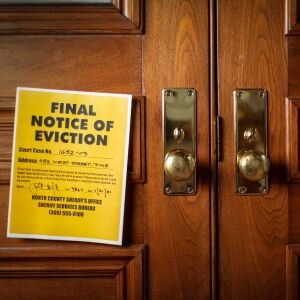
Legal Grounds for Eviction in California
In California, both landlords and renters need to know the legal reasons for eviction in order to deal with the Los Angeles real estate market. Finding a good reason to kick out a tenant is the first step in the eviction process in Los Angeles. These reasons must be allowed by state and local rules.
Some common legal reasons are not paying rent, breaking the terms of the lease, doing illegal things on the property, or doing a lot of damage to the property. Eviction is also an option for landlords who want to get rid of renters before taking the property off the rental market or for major renovations that require the tenants to leave.
As required by California’s statewide rent control laws and local policies like those in Los Angeles County, landlords should follow the law and give tenants enough notice. Not following these rules can cause the eviction process to be slowed down or thrown out.
Tenants in California also have rights that protect them from being evicted unfairly or in retaliation. This means that landlords have to show just cause before they can start the eviction process. This strikes a fair balance between protecting tenants’ rights and letting landlords keep their properties in good shape within the limits set by California’s strict legal requirements.
Common Reasons for Tenant Evictions in Southern California
In Southern California, especially in the competitive Los Angeles real estate market, landlords often have to evict tenants for a number of reasons. Nonpayment of rent is a common reason for eviction. Tenants fail to meet their financial responsibilities despite being warned several times or being given payment plans.
Eviction proceedings are also often started when lease violations happen. Some examples of lease violations are subletting without permission, keeping pets on the property against the terms of the lease, or doing illegal things on the property. Damage to property caused by tenants who don’t do their maintenance or purposely damage the rental unit is another common problem.
Landlords may also try to evict tenants if they get complaints about noise or other problems that make it hard for people in neighboring units to enjoy their peace and quiet. In some situations, owners may start a no-fault eviction if they want to live in the property themselves or do major repairs that require the tenants to move out.
Knowing these common reasons can help you understand how evictions work in Southern California’s real estate market.
Understanding Rent Control Laws Affecting LA Tenants and Landlords
Rent control laws are very important for both tenants and landlords in Los Angeles who are going through the eviction process. A big part of the city’s rent stabilization ordinance is setting limits on how much rent can go up each year for some rental properties. This has a direct effect on when and how evictions happen.
These laws are meant to protect renters from sudden and unfair rent increases and give landlords a clear set of rules to follow when they want to evict tenants. Landlords have to follow strict rules, such as having a good reason to remove a tenant, which could be not paying rent or breaking the terms of the lease.
Also, tenants who are forced to move because of certain legal conditions may be required to get help with their move. Being familiar with these rules makes sure that everyone stays within the law, which lowers the risk of conflicts and makes the real estate market run more smoothly.
Anyone who is involved in Los Angeles’s changing housing market needs to know how these rent control measures affect the eviction process as a whole.
Impact of Covid-19 on the Los Angeles Rental Market and Evictions
The COVID-19 pandemic significantly impacted the Los Angeles rental market, leading to unprecedented changes in eviction processes. As tenants faced financial hardships due to job losses and reduced income, the city implemented eviction moratoriums to protect renters from homelessness.
Because of COVID-related problems, these temporary rules stopped landlords from evicting renters who couldn’t pay their rent. This caused a backlog of possible evictions when these protections ended. Furthermore, the moratoriums changed the legal processes in Los Angeles real estate, as landlords had to learn how to follow new rules and deadlines for starting evictions.
Additionally, government relief programs provided rental assistance, attempting to stabilize both tenant security and landlord income during this tumultuous period. As the situation evolved, both tenants and property owners had to stay informed about changing local ordinances and state laws affecting eviction notices and timelines in response to the ongoing public health crisis.
Understanding the Eviction Process in Los Angeles, CA
For both landlords and tenants dealing with real estate problems, it is important to know how the eviction process works in Los Angeles, CA. The first step in the eviction process is to give the tenant a notice to quit. This could be a 3-day, 30-day, or 60-day notice, depending on the situation.

This notification gives tenants a chance to fix any lease violations or be ready to leave the property. If the renter doesn’t do what they’re told by the deadline, the landlord can file an unlawful detainer action with the Los Angeles Superior Court.
Once the renter files, they get a summons and a complaint, which gives them five days to answer. Landlords might ask for a default judgment to get the property back if they don’t hear back from the tenant.
But if the tenants fight the eviction by submitting a response, both sides may have to go to court to state their cases. After that, the court chooses whether or not to evict someone based on California rental regulations and lease agreements.
If the landlord wins the case, they must get a writ of possession from the court clerk before they may use a sheriff-assisted lockout to lawfully get their property back. Knowing these stages might help you follow the rules in your area and avoid problems that could come up throughout this legal process.
Key Steps in the Los Angeles Eviction Timeline
There are several important steps that both landlords and renters in Los Angeles must know in order to get rid of a tenant. The landlord must first give the renter a proper notice to vacate. The type of notice depends on the reason for eviction, such as not paying rent or breaking the lease.
A three-day notice to pay or leave and a thirty- or sixty-day notice to end the lease are common types of warnings. The landlord can sue for unlawful detainer in the Los Angeles Superior Court if the tenant doesn’t follow the warning.
A summons and complaint are sent to the tenant and they usually have five days to reply. If you don’t answer, the landlord can ask for a default ruling and take back the property.
Both sides will get ready for trial, where they will show evidence to a judge, if there is a dispute. If the judge rules in favor of the landlord, a writ of possession is given, which lets the police evict the tenant if they need to.
To make sure you follow the rules and protect your rights during this complicated process, you need to know about the local rent control laws and renter protections in Los Angeles.
How Long Does It Take to Complete a LA County Eviction?
The eviction process in Los Angeles County can be a lengthy and complex journey, often taking anywhere from several weeks to several months to complete. Initially, landlords must serve tenants with a proper notice, such as a 3-day notice to pay rent or quit, which gives tenants an opportunity to resolve the issue or vacate the property.
If the tenant fails to comply, the landlord can then file an unlawful detainer lawsuit in court. The timeline for this legal procedure depends on various factors, including court schedules and tenant responses.
Once filed, tenants have five days to respond; if they contest the eviction, a trial date is set, potentially prolonging the process by weeks or even months. Delays may also occur due to pandemic-related backlogs or tenant protections under local ordinances that temporarily extend timelines.
After a favorable judgment for the landlord, obtaining a writ of possession and coordinating with the sheriff’s department for execution can further extend the eviction timeline in Los Angeles real estate.
Landlord Obligations in the California Eviction Process
Because Los Angeles real estate is so complicated, it’s important for property owners to know what their rights are during the California eviction process. According to the law, landlords must follow certain steps, such as giving renters a written notice that makes it clear why they are being evicted and what they can do to avoid it.
This notice period is different for different reasons, like not paying rent or breaking the lease, and it has to follow California’s statewide renting laws. Landlords can file an unlawful detainer lawsuit in court if a tenant doesn’t fix the problem within the time limit. However, they must make sure that tenants receive all legal papers properly.
It’s very important for landlords to follow these steps exactly to avoid delays or legal problems. Also, landlords need to protect the rights of their tenants during this process and not do anything illegal, like locking out tenants or turning off utilities, which is against California law.
Proper paperwork and following state rules protect landlords from possible claims and make sure that the eviction process goes smoothly in Los Angeles. If you have any questions reach out to us at (855) 915-1382.
How to Legally Serve an Eviction Notice in La County
In Los Angeles County, owners must follow a strict set of rules to make sure they follow local and state laws when serving an eviction notice. First, choose the right type of eviction notice based on the reason for the eviction. For example, a 3-day notice to pay rent or quit for not paying rent, or a 30-day or 60-day notice for no-fault evictions, is what you need to do.
Once the right notice has been picked out, it needs to be properly filled out with all the necessary information, such as information about the tenant and, if relevant, the type of lease violation. The landlord must then give this notice to the tenant in one of three legal ways: by handing it to the tenant, leaving it with someone at least 18 years old at the residence and mailing a copy, or posting it somewhere noticeable on the property and mailing a copy if none of the other methods work.
Landlords must carefully record this process so that they can use it as proof in court if they need to. Not following these steps can cause the eviction case to be delayed or thrown out, which shows how important it is to fully understand and follow each law requirement in Los Angeles County.
Tenant Rights During Eviction in Los Angeles
Laws in Los Angeles and the state of California protect renters during the eviction process by giving them certain rights. Both tenants and owners need to know about these rights in order to understand the eviction process.

By law in California, landlords must have a good reason to evict a tenant, like not paying rent or breaking the rules of the lease, before they can start the process. Tenants have the right to get proper notice, which could be as little as three days to pay rent or leave, or as long as thirty or sixty days, based on the situation.
When tenants are given an eviction notice, they have five days to reply if they want to fight it. People who rent have the right to stay in their home during this time until a court order says otherwise.
There are also special protections for tenants in Los Angeles through rent control laws and “just cause” evictions. Additionally, tenants can get legal help and tools from housing rights organizations, which makes sure they can effectively fight unfair evictions.
Renters should know that it is against the law for landlords to take retaliatory actions, and it is also illegal for landlords to harass renters in order to get them to leave without giving them a fair trial. Knowing about these rights gives tenants in Los Angeles real estate more power during the eviction process.
Navigating Court Procedures for Evictions in Los Angeles
To follow the rules in Los Angeles, you need to know a lot about the legal process for evictions. In Los Angeles, if a tenant doesn’t leave the property by the deadline given in the eviction notice, the landlord must file an unlawful detainer case.
This step starts formal court procedures and entails following tight regulations and deadlines imposed by California law. Landlords need to get all the right paperwork ready, such as proof that the notice was served and any lease agreements, to back up their case in court.
During this time, it is very important for both landlords and tenants to know their rights and responsibilities. Tenants only have a short time to respond after being served with a summons and complaint. If you don’t answer, the landlord can get a default judgment in their favor, which makes it easier to evict you.
The court will set a date for a hearing when both sides can make their case. This is an important step in the eviction process in Los Angeles real estate, so it’s important to be ready. Legal representation or consultation could be useful to make sure that all procedural rules are followed and to increase the odds of winning in these difficult cases.
Mediation and Settlement Options Before Court Trial
When you sell your home for cash in Los Angeles, knowing about mediation and settlement choices before going to court can be very helpful when trying to get someone kicked out of their home. Landlords and renters can use mediation to settle their differences quickly and easily, without having to go to court.
At this point, both sides can talk things over with the help of a neutral third party to find answers that work for everyone. This method not only saves time and money on legal fees, but it also lets landlords and tenants make their own deals that may better meet their needs than court-ordered ones.
Payment plans, longer move-out dates, and other negotiated terms that help avoid the adversarial nature of a courtroom fight are common settlement options. By choosing mediation, the parties may be able to keep their relationship and come to a peaceful solution that follows all Los Angeles housing laws and rules. This would make the eviction process go much more quickly.
The Role of Sheriff’s Department in La County Evictions
In Los Angeles County, the Sheriff’s Department plays a crucial role in executing evictions as part of the legal eviction process. Once a landlord has obtained a court judgment for an unlawful detainer, it falls to the Sheriff’s Department to enforce this order by conducting the actual eviction.
This is done by giving the renters a notice to vacate, which usually gives them five days to leave on their own. If the tenants don’t leave by this date, deputies from the Sheriff’s Department will have to physically remove them from the land.
The involvement of law enforcement ensures that evictions are carried out in compliance with legal standards and that any potential for conflict or resistance is managed professionally and safely. The presence of sheriff’s deputies during this phase serves both as a deterrent to disruption and as a means of upholding public safety throughout the eviction process in Los Angeles real estate.
Strategies to Delay or Contest an Eviction in CA
In Los Angeles real estate, tenants facing eviction have several strategies to delay or contest the process under California law. Understanding tenant rights is crucial, as these provide a foundation for any defense.
One good idea is to carefully read the eviction notice for mistakes; mistakes in details like dates or reasons can be a reason to throw the case out. Tenants can also file a statement with the court, which stops the eviction process and lets the case be looked over.
Tenant defense groups can help you get legal help and give you extra support and advice that is tailored to your case. Another option is to talk to the landlords and try to come to an understanding. Sometimes, just getting along can stop the whole process.
Also, applying for local rental support programs could help with money problems that keep people from being evicted for not paying their rent. Using the mediation services that housing officials offer can also help landlords and tenants come to an agreement that works for both of them.
These strategies not only give tenants more time to stay in their homes, but they also give them chances to fight unfair evictions under California’s tenant protection rules.
Filing a Motion to Stay an Eviction Order
Filing a request to stay an eviction order is an important step for Los Angeles tenants who are about to be kicked out of their homes. This legal move temporarily stops an eviction from happening, giving tenants more time to think about their choices or look for new housing.

To start this process, the tenant must quickly file the necessary paperwork with the court after the eviction order has been given. Tenants must provide strong reasons in their motion, such as proof of mistakes made during the initial eviction procedures or proof of financial problems that make it impossible for them to move right away.
When submitting a motion to stay, the Los Angeles Superior Court wants specific paperwork and must be done by a certain date. Tenants need to make sure they fully understand these requirements. It is also very important for tenants to show up to any meetings that are planned related to the motion. This is their chance to make their case directly to a judge.
Eazy House Sale can help or advice from tenant support groups can be very helpful during this process. This will make sure that all the steps are taken correctly and quickly, even though Los Angeles real estate law is very complicated.
Protecting Tenant’s Belongings Post-eviction Judgment
Once a tenant is evicted in Los Angeles, protecting their things becomes very important. California law says that landlords must follow certain steps to protect their renters’ belongings after they are evicted.
When the sheriff issues the lockout, renters may only have a short time to get their things back. If the landlord tells the tenant in person, they have to store the things safely for at least 15 days. If they tell the tenant by mail, they have to do it for 18 days.
People who rent can get their things back during this time for free. If landlords don’t hear from the unclaimed items within this time frame, they can sell or throw them away. However, any money made from sales must first be used to pay for storage costs and then be given back to the former renter.
Knowing these legal duties helps protect the rights of both the landlord and the renter while also making sure that Los Angeles real estate rules about what to do after an eviction are followed.
How Long Does It Take to Evict Someone in Los Angeles?
In Los Angeles, evicting a tenant is a complicated process that can take weeks or months, based on things like the type of eviction and how the tenant reacts. The process of evicting someone starts with giving them the right notice, like a 3-day notice to pay rent or leave or a 30-day notice for other lease violations.
Landlords must file a case for unlawful detainer in the Los Angeles County Superior Court if the tenant does not follow the rules. Due to court schedules and rules of procedure, this formal step can take a few weeks.
Tenants have five days to reply after the notice is filed; if they don’t, the landlord can ask for a default judgment. If the case goes to court, it could add another few weeks to the deadline.
Landlords get a writ of possession after getting a good court ruling. This lets the sheriff evict the tenant within about two weeks. It is very important for landlords in Los Angeles to follow the local rent control laws and tenant safety ordinances during the eviction process. If they don’t, the process could take longer and the landlords could face legal consequences.
Do You Have 30 Days After an Eviction Notice in California?
It’s important for both renters and landlords in Los Angeles to know how long the eviction process takes. Tenants usually have 30 days to leave their home after receiving an eviction notice, which is also known as a “Notice to Quit.” This is the case if the renter has lived there for less than a year or if no specific reason is given.
If the renter has lived in the rental place for more than a year, however, this 30-day notice can be extended to 60 days. It is important to keep in mind that these letters are only the first step in the California eviction process.
If renters don’t do what the landlords say within this time frame, they have to file an unlawful detainer lawsuit, which has its own set of legal steps and deadlines. Tenants have rights during this time and can fight the eviction in court.
By understanding these important details of California’s eviction laws, both sides can handle this tricky real estate issue in a way that follows the rules in Los Angeles County.
What Are the New Eviction Rules in Los Angeles?
Los Angeles’s eviction laws have changed a lot in the last few years to protect tenants and deal with the housing problem. As of 2023, new rules have been put in place to protect tenants more and make the removal process more clear.
With these new rules, owners have to give tenants more notice before they can start the eviction process. For example, they now have to give 30 days’ notice for most no-fault evictions and 60 days’ notice for tenants who have lived in the house for more than a year.
The city has also made it easier for landlords to evict tenants with “just cause.” This means that they have to give a good reason for the eviction, like not paying rent or breaking the rules of the lease. Also, rent rises are limited to a certain percentage per year. This helps keep people from having to move because they can’t afford the higher rent.
To help tenants deal with these new eviction rules, Los Angeles has also set up rental assistance programs and legal aid tools. The new rules are meant to make the housing market more fair by balancing the rights of tenants and the duties of landlords. This will lead to more stable neighborhoods all over Los Angeles.
How Hard Is It to Get Evicted in California?
Eviction in California, particularly in Los Angeles, can be a complex and challenging process due to the state’s extensive tenant protection laws. Understanding the timeline of the eviction process is crucial for both landlords and tenants navigating the real estate landscape.
In California, landlords must follow strict legal procedures beginning with providing tenants a valid reason for eviction, such as non-payment of rent or lease violations. The process starts with serving an appropriate notice, like a 3-day notice to pay rent or quit.
If the tenant does not comply, landlords must then file an unlawful detainer lawsuit in court to seek possession of the property legally. This legal framework means that it can take several weeks or even months before an eviction is finalized.
Additionally, tenants have the right to contest evictions and may receive assistance from local housing organizations or legal aid services to prolong their stay. The intricate regulations are designed to protect tenants from wrongful evictions but can make it difficult for landlords to reclaim their properties quickly.
Therefore, understanding each step of this timeline is essential for those involved in Los Angeles real estate transactions involving potential evictions. Sell Your Home San Diego to Eazy House Sale, we make fair cash offers and buy houses as-is no repairs, no fees, no hassle. We handle the entire process for you. Call (855) 915-1382 today for a no-obligation offer and start your stress-free home sale.
| COURTS | LEGAL ACTION | LAWSUIT< | CIVIL CASE | PAYMENT METHODS | POLICE REPORTS |
| PROCESS SERVER | ATTORNEY | OFFENSES | CRIMINAL BEHAVIOR | ILLEGAL ACTIVITY | CRIMINAL ACTIVITY |
| SERVER | DAMAGES | RENT-CONTROLLED | ATTORNEY FEES | SAN DIEGO | JURISDICTIONS |
| FEE | COMMUNICATION | ATTENTION | APPEALS | ACCOUNTING | TENANT SCREENING |
| RENTAL AGREEMENT | LEGAL ADVICE | HABITABILITY | INBOX | SANTA ANA, CA | |
| RETALIATORY EVICTION | OCCUPANCY | NUISANCE | MONEY | LIABILITY | DEFENDANT |
| COMPLEXITY | CORONAVIRUS | EVICTION PROCESS FOR | AN EVICTION CASE | EVICT A TENANT | TO EVICT A |
| EVICTION PROCESS CAN TAKE | THE EVICTION PROCESS CAN | THE EVICTION PROCESS AND | TO EVICT A TENANT | TENANT DOES NOT RESPOND |
Helpful Los Angeles Blog Articles
- Sell Your House Directly To The Bank In Los Angeles, CA
- Taxes When Selling Inherited Real Estate In Los Angeles, CA
- Understanding Hospital Liens On Homes In Los Angeles, CA
- Leveraging Title Companies For A Smooth Home Sale in Los Angeles, CA
- Comprehensive House Mold Remediation Services In Los Angeles, CA
- The Eviction Process In Los Angeles, CA, Real Estate
- Can Someone Else Take Over Your Los Angeles, CA, Home Loan?
- Selling Your Elderly Parent’s Home In Los Angeles, CA
- Is Remodeling Your Kitchen in Los Angeles, CA, Before Selling Smart?
- Selling Your Duplex House In Los Angeles, California
- How much Equity do I need to sell my house in Los Angeles, CA
- Homeowners Insurance Considerations for Home Sellers in Los Angeles, CA
- Process Of Short Selling Your Los Angeles, CA, Home To A Relative
- Short Sell Rental Property in Los Angeles, CA
- Should I Replace My Roof Before I Sell My House in Los Angeles, CA?

